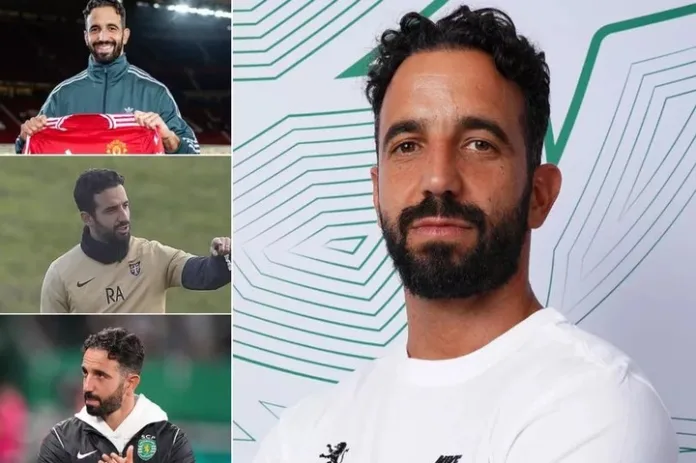Manchester United released images of Ruben Amorim’s first training session at Carrington earlier this week. The players were smiling and looked to be in tremendous spirits, but David Rosa remembers his first few sessions working with Amorim at Casa Pia slightly differently.
“I remember that he was the first coach I ever met who left me with a headache at the end of the first week of training, such was the amount of information I had to process,” said Rosa.
United believe they have appointed one of the world’s finest coaches and Rosa regards Amorim as the best that he encountered during his career, even if he did give him a headache.
Amorim will have to be every bit as good as his reputation. The 39-year-old has inherited a United side that struggles to score goals and currently sits 13th in the Premier League, but he took over at Sporting Lisbon in similar circumstances and led them to their first league title for 19 years.
Amorim’s rise in Portugal was remarkable and it started at Casa Pia, a small and modest club in Lisbon that is dwarfed by its inner-city neighbours Sporting and Benfica. Amorim had only just retired from playing and lived nearby, so he approached the then-third division side in 2018.
Casa Pia play at a stadium with a capacity of just over 2,500 and were an amateur team. Amorim lost his first two games in charge and said he would quit if he suffered a third defeat.
Amorim won that game, changed the team’s formation and began a special journey. Rosa’s arrival at Casa Pia coincided with Amorim’s and he still has fond memories of that time.
Rosa recently spoke to the Manchester Evening News about Amorim and said: “Ruben always showed great openness and was very friendly from the start. And I think regardless of the club he coaches or the league he’s in, his attitude has been the same since his first day as coach.
“The area where he has always stood out from other coaches is undoubtedly the relationships he creates with players and I would say those relationships are the key to his success.
“He’s able to understand his players, know exactly what they’re thinking and what they’re feeling. He is able to have a group of 26 players in the squad where everyone is motivated and where he clearly shows the importance that each one has in the team. Then he showed not only a very strong knowledge of the game but an unshakeable belief in his idea of the game.
“Ruben has all the traits of what I think a leader should have. He knows exactly what he wants from each player and manages to convey that message in a very simple and clear way. There is no greater challenge for a coach or leader than managing the expectations of his team.
“Often the expectations of each player are blurred by what the coach expects of that player. Ruben has incredible communication skills and manages the player’s expectations by showing how important he is to the bigger picture and like I said, has a clear ideology of the game model he wants.”
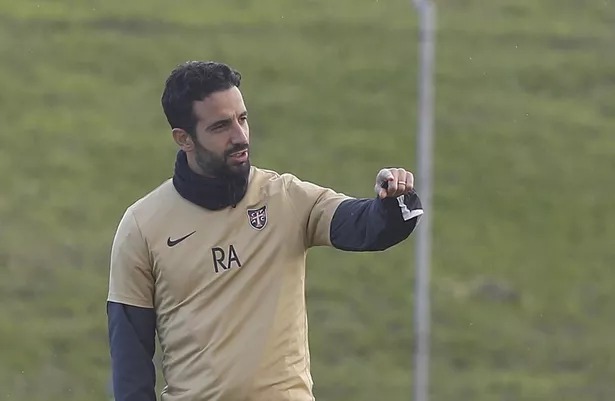
Erik ten Hag was criticised for failing to implement a clear identity during his time at Old Trafford and United often looked unorganised, something which Amorim should address.
“He knows his game model so well that he can explain it clearly and simply to any player in any position. And that meant when we were on the pitch, we knew exactly what to do,” said Rosa.
“It wasn’t as if we were robots, but we knew that whenever we received the ball what was going to happen around us. That gave us a great advantage, which was that we had some predictability about what was going to happen. It made it easier for us to make decisions.
“I often say, and I truly mean this, that if we sat down in a huddle at Casa Pia, with one player per table as if it were a test, with a blank sheet of paper, each of us would know exactly what to do.
“We would know what passing solutions or actions we would have when we received the ball, and we would even be able to talk about positions other than our own.
“There’s no doubt that the fact that he was a player has helped him in his career so far. The fact that he was a player meant that he went through various situations, such as being a starter, being a substitute or not being called up. So here he had the experience that every player has.
“And this has allowed him to know what each player is feeling. Then the midfielders are players who, because they are positioned in the centre, have to have a more comprehensive knowledge of team dynamics, so they know the positions to take and the movements inside out.”
When asked about Amorim’s training sessions, Rosa responded: “I used to say that his training sessions weren’t his holy grail. When I say that, I mean the type of exercises he used.
“What set him apart was the way he applied the exercises. The same exercise given by different coaches will have different results. What some coaches saw as the goal of a particular exercise, he managed to change the paradigm and show that that exercise could have much more than just a goal. Then it has a lot to do with the intensity and demand he puts on the exercises.”
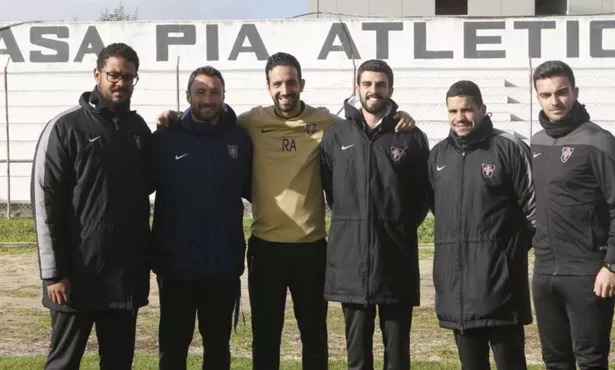
Casa Pia’s players bought into Amorim’s system. They appreciated his willingness to invest in them as people and Deritson Lopes described Amorim as “the angel” in his life in an interview in 2020, as United’s new head coach went to extraordinary lengths to help him away from the pitch.
Lopes also played for Casa Pia but needed help in supporting his young family and Amorim incredibly found them a house and paid for the rent for a whole year. There are thought to be other, similar stories about Amorim helping his players but he does not seek publicity.
Amorim’s now famous 3-4-3 system saw Casa Pia embark on an unbeaten run and he began to make national headlines in Portugal because he didn’t have the required coaching badges.
In January 2019, Casa Pia were deducted six points and Amorim was suspended for one year for giving instructions during a match without having the required coaching level to do so.
The ban was subsequently suspended but Amorim resigned. “Here in Portugal, he had an issue with his coaching badges,” Joao Nuno Fonseca told the MEN. “That was something that got our attention here in Portugal because when you’re not eligible to be the head coach, you need to be registered as an assistant then someone with the UEFA Pro licence takes the lead.”
Fonseca was the assistant manager of Benfica B during Amorim’s rise in Portugal and kindly provided insight into his journey beyond Casa Pia. “It picked up our attention from outside because he wasn’t legally eligible to do it, but the club had the power and trust to let him do it,” he said.
“It was unique because they gave an opportunity to someone who didn’t have the diploma to receive it. He was regarded as exciting even at Casa Pia and the strength of his communication about the topics on the coaching badges made some impact in the news in Portugal.
“His capability to justify, to get in depth about his tactical approach kept the attention of the presidents of the clubs and you see this on the social media nowadays with journalists, you see his capability to communicate well and to pass the message on clearly. This is huge.”
Amorim speaks outstanding English, he understands the nuances of the language and a club source has admitted that will be a hugely helpful skill. Ten Hag’s communication wasn’t a strength but everyone you speak to about Amorim praises his ability to communicate and empathise.
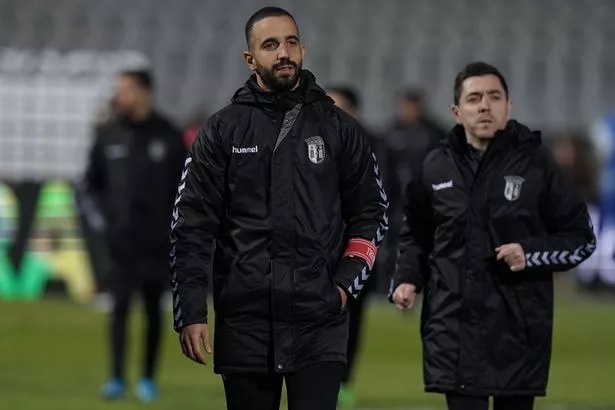
It didn’t take long for Amorim to return to coaching after his departure from Casa Pia. He was appointed as manager of Braga’s reserves in September 2019, winning seven of his eight games, and was asked to take charge of the first-team after they sacked their manager.
Amorim’s first game in charge of Braga came on January 4, 2020 and he became Sporting’s manager just 60 days later. Sporting were in turmoil and took a punt on Amorim, despite him having just two months of experience managing in the Portuguese top-flight, but they spotted something.
Sporting paid a substantial €10million to hire Amorim, along with his assistants Carlos Fernandes and Adelio Candido, and the Portuguese media, fans and coaches were gripped by the story.
“It caused not a shock but a surprise because Sporting, in the years before Ruben entered the club, were the kind of club that sacked a coach almost every six months,” explained Fonseca.
“Coaches were the most vulnerable in the politics of the club and were sacked often, but they made an effort to bring him from Braga and that step created an impact on everyone because when you pay €10m for a head coach inside your own country, it represents something.
“I think that created the exciting part from the outside looking in at the situation. Everyone wanted to see what Ruben was capable of doing to make sure his market value was €10m.”
It turned out Sporting got their money’s worth. Amorim won the Liga Nos title in his first season in charge, leading Sporting to their first league triumph in almost two decades, he won the Portuguese League Cup twice, the Portuguese Super Cup, and another league title to boot.
In the summer, there was surprise in Portugal that Amorim wasn’t lured away from Sporting but United came calling when Ten Hag was axed and he was ready for the opportunity.
So what should United fans expect? “He’s very intense,” Fonseca said. “I think he’s a coach that has his own ideas, of course on possession based, but he can also adapt his strategies.
“I think this season that’s been one of the biggest points that made him so strong. He can read the game and change because he was a player before, so he feels the things inside the pitch and he can have an impact now he’s on the bench. I think this is a very, very, very strong point.
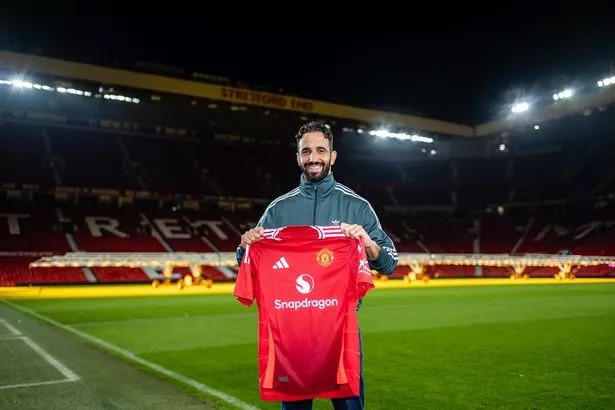
“That’s what I took from being outside and look at his last game with Sporting. He was losing 2-0 until half-time, he switched and won 4-2 in the end. This is a very powerful capability.
“I think he’s also manager that gives opportunities to young players, like he did at Sporting, and when you give that opportunity, you need to know them, of course, and need to follow their progress for the reserve team and check if they are capable to enter to the first-team level.
“This kind of communication with the reserve team and teams below is crucial and again, it goes back to the main point that I’ve told you: his communication is a huge strength.
“The capability to communicate ideas, the link of information that you can bring inside the club and in my opinion, when you are capable of giving opportunities to young players, you are playing a strong card because you give them the chance to show their creativity and skill.”
Fonseca continued: “When players are young they are like… street guys. They aren’t afraid to make a one-on-one against a top player, they just do it, and they do it because they can do it.
“It’s the capability to be direct with players. And of course, empathy because when you’re empathetic you create communication and a link with everyone. So in that sense, when you have that skill, you make a huge step to be successful, so I think he has all the ingredients to do well.
“He can be one of the best managers for Manchester United but will need time. He needs trust from the players and fans because when you don’t have results sometimes it’s difficult.
“But like Arsenal did with Mikel Arteta, Manchester United need to do that with Amorim because you need time to do good work. You need patience to be successful and time to fail sometimes. With failure, you get stronger and with Ruben’s ideas, I think United will go to the top soon.”
The Amorim era has begun in Manchester. You should strap yourself in for the ride.
